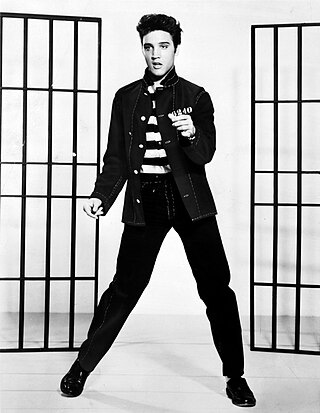
Elvis Aaron Presley, also known mononymously as Elvis, was an American singer and actor. Known as the "King of Rock and Roll", he is regarded as one of the most significant cultural figures of the 20th century. Presley's energized interpretations of songs and sexually provocative performance style, combined with a singularly potent mix of influences across color lines during a transformative era in race relations, brought both great success and initial controversy.
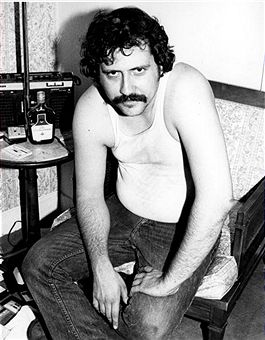
Leslie Conway "Lester" Bangs was an American music journalist. He wrote for Creem and Rolling Stone magazines, and was a leading influence in rock music criticism. The music critic Jim DeRogatis called him "America's greatest rock critic".
Peter Guralnick is an American music critic, author, and screenwriter. He specializes in the history of early rock and roll and has written books on Elvis Presley, Sam Phillips, and Sam Cooke.
Noise music is a genre of music that is characterised by the expressive use of noise. This type of music tends to challenge the distinction that is made in conventional musical practices between musical and non-musical sound. Noise music includes a wide range of musical styles and sound-based creative practices that feature noise as a primary aspect.
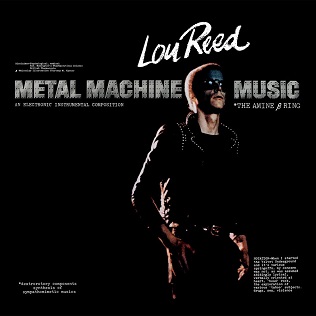
Metal Machine Music is the fifth studio album by American rock musician Lou Reed. It was recorded on a three-speed Uher machine and was mastered/engineered by Bob Ludwig. It was released as a double album in July 1975 by RCA Records, but taken off the market three weeks later. A radical departure from the rest of his catalog, the Metal Machine Music album features no songs or recognizably structured compositions, eschewing melody and rhythm for modulated feedback and noise music guitar effects, mixed at varying speeds by Reed. Also in 1975, RCA released a Quadrophonic version of the Metal Machine Music recording that was produced by playing it back both forward and backward, and by flipping the tape over.
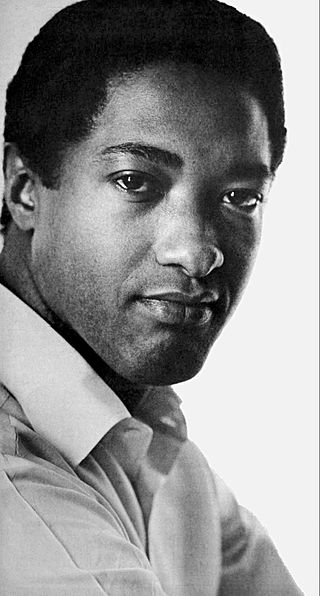
Samuel Cook, known professionally as Sam Cooke, was an American singer and songwriter. Considered one of the most influential soul artists of all time, Cooke is commonly referred to as the "King of Soul" for his distinctive vocals, pioneering contributions to the genre, and significance in popular music. During his eight-year career, Cooke released 29 singles that charted in the Top 40 of the Billboard Pop Singles chart, as well as 20 singles in the Top Ten of Billboard's Black Singles chart. In 1964, Cooke was shot and killed by the manager of a motel in Los Angeles. After an inquest and investigation, the courts ruled Cooke's death to be a justifiable homicide. His family has since questioned the circumstances of his death. Cooke is included on Billboard's 2015 list of the 35 greatest R&B artists of all time.

Astral Weeks is the second studio album by Northern Irish singer-songwriter Van Morrison. It was recorded at Century Sound Studios in New York during September and October 1968, and released in November of the same year by Warner Bros. Records.
Robert Wolfe Quine was an American guitarist. A native of Akron, Ohio, Quine worked with a wide range of musicians, though he himself remained relatively unknown. Critic Mark Deming wrote that "Quine's eclectic style embraced influences from jazz, rock, and blues players of all stripes, and his thoughtful technique and uncompromising approach led to rewarding collaborations with a number of visionary musicians."

Ikue Mori, also known as Ikue Ile, is a drummer, electronic musician, composer, and graphic designer. Mori was awarded a "Genius grant" from the MacArthur Foundation in 2022.

Greil Marcus is an American author, music journalist and cultural critic. He is notable for producing scholarly and literary essays that place rock music in a broader framework of culture and politics.
"Psychotic Reactions and Carburetor Dung" was a 1971 essay by Lester Bangs, later collected in a book of the same name (ISBN 0-679-72045-6). The essay, which talks about what is today called garage rock, contains the phrase, "...punk bands started cropping up who were writing their own songs but taking the Yardbirds' sound." This is believed to be one of the first uses of the word "punk" to refer to a type of rock music. A large section of the essay is concerned with the imagined longer career of the garage band the Count Five, after their hit "Psychotic Reaction". The band split after one album, but Bangs' discussion of the imagined subsequent records is entirely fanciful.
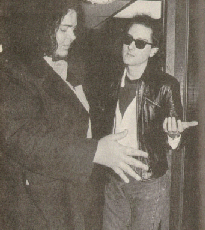
Peter Laughner was an American guitarist, songwriter and singer.
"Sister Ray" is a song by the Velvet Underground that closes side two of their 1968 album White Light/White Heat. The lyrics are by Lou Reed, with music composed by John Cale, Sterling Morrison, Maureen Tucker and Reed.

Count Five was an American garage rock band, formed in San Jose, California in 1964, best known for their hit single "Psychotic Reaction".

The Bells is the ninth solo studio album by American rock musician Lou Reed, released in May 1979 by Arista Records. It was recorded in binaural sound at Delta Studios in Wilster, West Germany. Production was handled by Reed with Michael Fonfara serving as executive producer. Three out of nine songs on the album are the product of a short-lived writing partnership between Reed and Nils Lofgren. More of the team's work appeared on Nils' solo studio album Nils, released the same year. Lofgren released his version of "Stupid Man" as "Driftin' Man" on Break Away Angel (2001). Lofgren resurrected five songs he wrote with Reed in the late 70s on Blue with Lou (2019).

"Psychotic Reaction" is the debut single by the American garage rock band Count Five, released in June 1966 on their debut studio album of the same name.

Jeffrey Morgan is a Canadian writer and photographer who is best known for being the authorized biographer of both Alice Cooper and Iggy Pop and The Stooges.
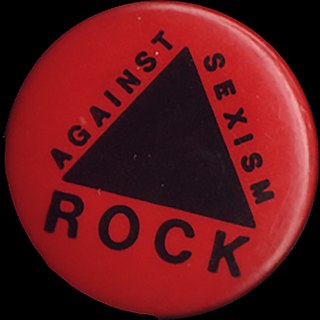
Rock Against Sexism (RAS) was a political and cultural movement dedicated to promoting women in music, and challenging sexism in the rock music community, pop culture and in the world at large. It was primarily a part of the punk rock music and arts scene.
Carburetor Dung is a Malaysian punk rock band formed in 1991 in Kuala Lumpur. Formed by bassist Fendi as a band called Stormfish but later changed its name to Carburetor Dung when guitarist Joe Kidd joined the fold. The name came from Lester Bangs' book Psychotic Reactions and Carburetor Dung.
"Let Us Now Praise Famous Death Dwarves (or how I slugged it out with Lou Reed and stayed awake)" is an infamous interview with Lou Reed conducted by Lester Bangs and published in Creem magazine in 1975. It is now regarded as a classic document of music journalism. The title is a play on Let Us Now Praise Famous Men, the book by James Agee. The full interview was reprinted in the New Musical Express in November 2013, as a tribute to Lou Reed, who died the previous month.













